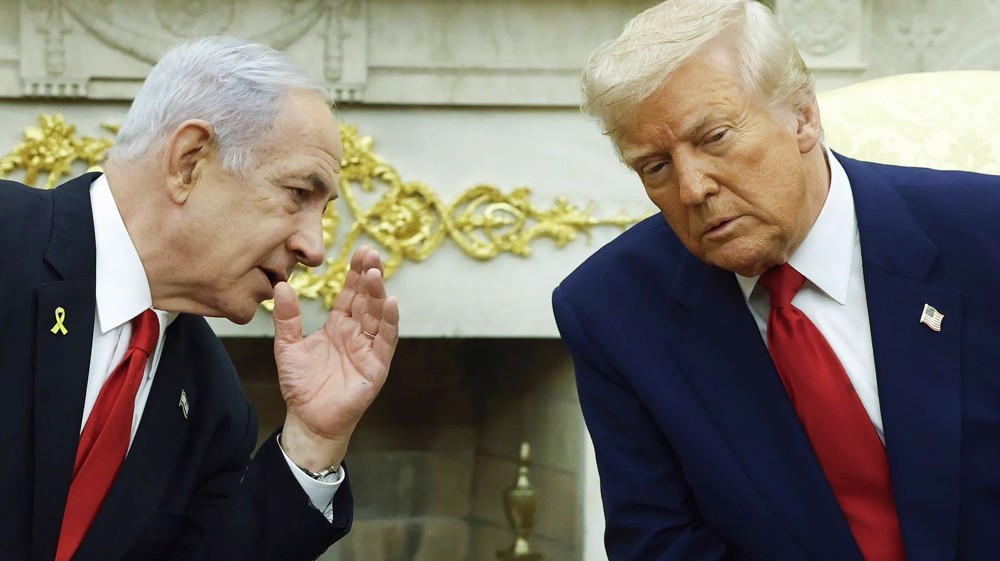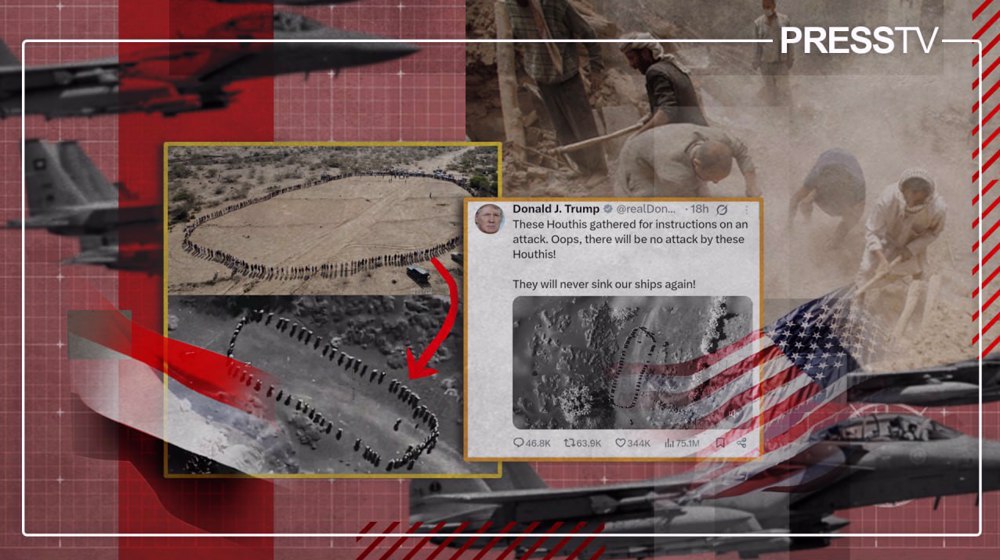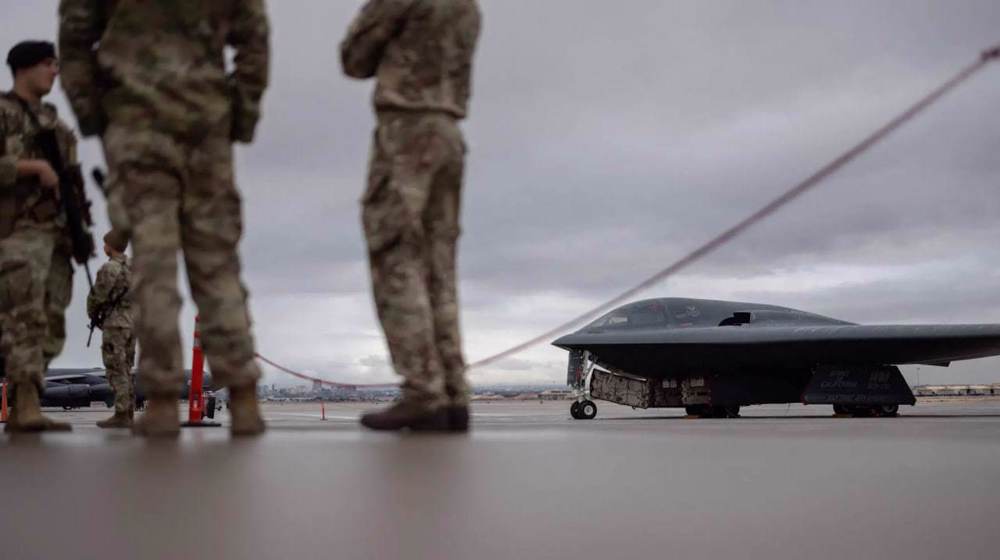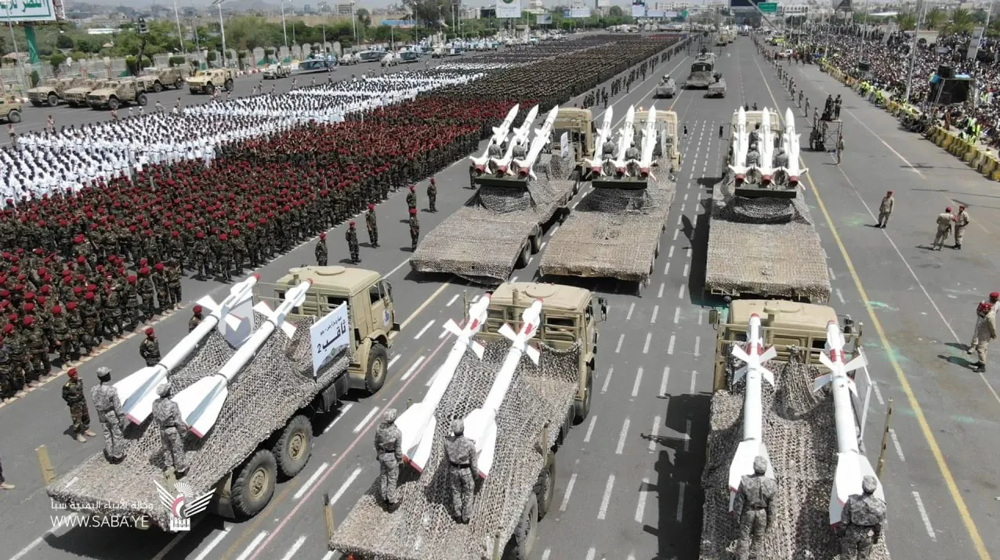Eye for an eye: Yemen upends US-UK-Israeli war plots, stands unshaken with Gaza
By Ivan Kesic
Since March 2025, Yemen has resumed and intensified its military operations, primarily in response to the Israeli genocidal war and the blockade of humanitarian aid to Gaza, as well as the ongoing American attacks against the Arab country.
Following a ceasefire in Gaza that ended in January 2025, the Yemeni military had paused its pro-Gaza operations targeting Israeli-linked shipping in the waters of the Indian Ocean.
However, after Israel blocked aid to Gaza on March 2, the Yemeni armed forces issued a four-day ultimatum for the blockade to be lifted, warning that retaliatory operations would resume.
Abdul-Malik al-Houthi, the Ansarullah resistance movement leader, sternly warned the occupying regime against reigniting the Gaza war, emphasizing that any resumption of fighting would result in retaliatory strikes targeting Israeli-occupied territories, particularly Tel Aviv.
When this demand went unheeded, they announced on March 11 the resumption of operations targeting vessels in the Red Sea, Arabian Sea, Bab al-Mandab Strait, and Gulf of Aden.
Yemen specifically warned that "any Israeli vessel" in these waters would be a target in the declared operational area and that this ban will remain in place until the crossings to the Gaza Strip are reopened and aid, food, and medicine are allowed in.
In their official statement, the Yemeni armed forces saluted the steadfast Palestinian people in the Gaza Strip and the occupied West Bank and affirmed that they will stand by the valiant Palestinian resistance.
Collapsing Empire: Yemen shatters the illusion of US air power, yet again
— Press TV 🔻 (@PressTV) April 8, 2025
Follow: https://t.co/GKZwI4ehqL pic.twitter.com/ubKCT9vrLg
The Palestinian resistance movement Hamas welcomed Yemen's four-day ultimatum to the Israeli regime, describing it as "a courageous decision" that reflects the deep bond of the brotherly Yemeni people with Palestine and Jerusalem al-Quds.
Prior to March 2025, the Yemeni forces had conducted over 190 attacks on shipping since October 2023, sinking two ships and seizing one, indicating the scale of their campaign.
US-UK escalate aggression
Yemen's operations against the Israeli regime have frustrated the international Zionist network and its Western backers. As admitted by US intelligence, attacks on the Arab country have failed to achieve any desired results for Washington.
Back in January, Trump signed an executive order announcing the return of the Ansarullah resistance movement to the official US list of "foreign terrorist organizations," which he had previously designated during his first term, but the Joe Biden administration had removed it.
The main cited reasons for the blacklisting were Yemen's firing of 300 missiles at the Zionist entity since October 2023, and over a hundred attacks on Israel-linked ships transiting Bab al-Mandeb.
Trump acknowledged in an executive order that Yemeni operations had forced Red Sea maritime commercial traffic to reroute and led to global inflation, directly contradicting earlier official statements that downplayed their significance.
On March 4, amid a four-day Yemeni ultimatum to the Israeli regime, US Secretary of State Marco Rubio announced that the US State Department had designated Ansarullah as a "terrorist" organization.
That same evening, the Yemeni armed forces announced that they had shot down a US MQ-9 Reaper over the western province of al-Hudaydah, the fifteenth drone of its type in the last two years, after it violated the country's airspace.
The next day, in an apparent act of revenge, Trump imposed sanctions on seven leaders of the Ansarullah movement, accusing them of allegedly "smuggling military-grade items and weapon systems."
From Iraq to Yemen: The American long-standing legacy of bringing death and destruction to civilians
— Press TV 🔻 (@PressTV) April 5, 2025
Follow: https://t.co/B3zXG73Jym pic.twitter.com/VSjJ70OzKL
On March 15, four days after Yemen announced it was resuming operations against Israeli shipping in the Indian Ocean, Trump authorized the start of an attack on the Arab country.
With this move, he broke long-held promises not to start new wars and faced harsh criticism even from his own followers, who accused him of "fighting Israeli battles."
US and UK warplanes have savagely attacked civilian infrastructure across Yemen, using regional bases and the Nimitz-class aircraft carrier, USS Harry Truma,n as launch pads, which resulted in the deaths of around 30 civilians on the first day alone.
Trump further threatened to hold Iran responsible for Yemeni counterattacks, interpreted by experts as lukewarm attempts to persuade Tehran to lobby in Sana'a for restraint.
The American-British-Israeli trio has been launching attacks on Yemen for months, but each time, it has backed down in the face of intensified Yemeni counterattacks, halting attacks, withdrawing the fleet, and giving various lame excuses.
In addition to the strategic failure at sea, Yemen has also depleted the tactical stockpiles of the US Navy, which has fired more air defense missiles in the last 16 months than in the previous three decades combined.
Yemen strikes back
Just a day after the start of the latest US-UK aggression, the Yemeni armed forces responded by targeting the US aircraft carrier, USS Harry Truman, and its accompanying vessels in the Red Sea.
Brigadier General Yahya Saree, the spokesman for the Yemeni military, announced that Yemen had used 18 ballistic and cruise missiles, along with drones, against the US Navy strike group.
He further warned that the Yemeni armed forces will not hesitate to continue targeting US warships in the region, vowing to continue the naval blockade on Israeli vessels until humanitarian aid reaches the Gaza Strip.
Ansarullah leader al-Houthi also warned Washington that they will confront aggression with escalation and that the Yemeni military will further target the US aircraft carriers and warships in the region.
He said American aggression is a failure and will fail without achieving its goals, emphasizing that Yemen and the Yemeni people will not retreat from their stance about Gaza.
Abdulrahman al-Ahnoumi, director of the Yemeni General Corporation for Radio and Television, was quoted as saying that Sana'a was "not broken by 200,000 raids, and a million raids will not break its steadfastness."
Simultaneously, Yemenis have been staging massive nationwide rallies in the capital city and other provinces every week, vowing to confront the US aggression through military escalation, general mobilization, and economic embargoes against adversaries.
The Ansarullah leader stresses that US non-stop military operations against Yemen won't be able to stop the nation from supporting Palestine. pic.twitter.com/1ltdzz1LFt
— Press TV 🔻 (@PressTV) April 10, 2025
In the first 48 hours of the US aggression alone, Yemeni armed forces targeted the US aircraft carrier strike group three times with salvos of missiles and swarms of drones.
The third time, the USS Harry Truman carrier in the northern Red Sea was targeted with two cruise missiles and two drones, and a US destroyer with a cruise missile and four drones.
According to Yemeni officials, the enemy was struck by a state of confusion, which prompted many of its warships to retreat towards the northern Red Sea region.
On the other hand, US officials announced that they intercepted 11 drones in just one attack, which, if true, indicates that they are spending large amounts of expensive air defense missiles.
Yemeni operations continue
The Yemeni Air Force shot down another expensive US MQ-9 reconnaissance drone in late March and two more in the next ten days, bringing the total to eighteen such aircraft since October 2023.
Yemen also escalated strikes on the Zionist entity in the meantime, launching ballistic missiles and drones aimed at occupied Palestinian territories.
They have announced the successful targeting of Israeli Nevatim Airbase, from which the attacks on Gaza are being carried out, using a hypersonic ballistic missile named Palestine-2.
In the second half of March, they conducted at least eight such strikes, with one notable incident on March 30, when a ballistic missile triggered sirens in the central entity and caused widespread panic.
The target of that strike was Ben Gurion Airport, which had also been targeted on at least three other occasions in the earlier days, making the skies over the occupied territories unsafe for air traffic.
Although the Israeli regime attempted to downplay these strikes, Hamas praised the Yemenis for their direct anti-Israeli support, urging them to continue such retaliatory operations.
On March 22, Washington announced the dispatch of another aircraft carrier strike group to Yemen, described by Yemeni officials as a sign of US abject failure in the face of Sana’a’s determined pro-Palestinian and defensive efforts.
✍️ Viewpoint -US war machine in Yemen: Bombing civilian gatherings and getting away with it
— Press TV 🔻 (@PressTV) April 12, 2025
By Roya Pour Bagherhttps://t.co/Uw48O6rzXx
The second carrier, the USS Carl Vinson, armed with F-35C stealth warplanes, arrived in the region on April 11, further confirming that Washington's initial estimates of Yemeni strength were underestimated.
According to reports by US broadcaster CNN this month, citing three different sources, the US aggression cost around $1 billion in three weeks, yet it has fallen far short of deterring the country that has now threatened to extend the scope of its retaliatory strikes.
Officials from the Pentagon’s Joint Staff, Central Command, Indo-Pacific Command, the Office of the Undersecretary of Defense for Policy, and the State Department acknowledged to Congress that Yemeni forces have continued to fortify bunkers and maintain underground weapons stockpiles.
Although US officials claimed that several mid-level Yemeni commanders were killed, Sana’a rejected those claims, and US intelligence analysts say Yemen's senior leadership remains intact.
Qatar warns Gaza deal not a true ceasefire without Israeli withdrawal
Explainer: Why is America losing its young generation to mental health epidemic
Hidden strengths of Iran’s post-revolution economy
UK Supreme Court dockets Iran’s appeal over London building confiscation
Israeli airstrikes kill three more in northern Gaza amid truce breaches
EU targeting platforms that refuse to ‘censor free speech’: Telegram CEO
Chechen leader vows retaliation after Ukrainian drone strike
US pressures European allies to take over NATO duties by 2027: Report















 This makes it easy to access the Press TV website
This makes it easy to access the Press TV website